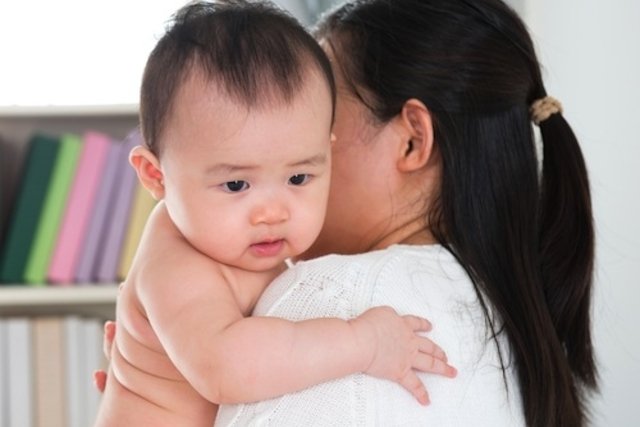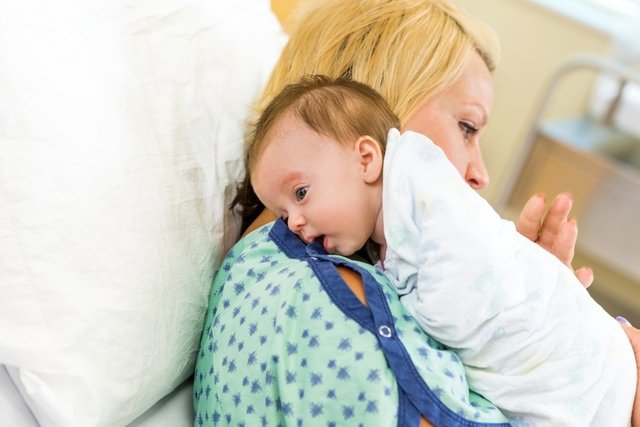Hiccups in babies are common in the first year of life, appearing in newborns mainly after feeding. It can also appear in the baby while still in the mother’s womb, especially in the last days of pregnancy.
Hiccups occur due to the involuntary contraction of the diaphragm and respiratory muscles when stimulated or irritated and, most of the time, it does not have a specific cause in the baby.
Typically, hiccups improve within a few minutes without the need for treatment. However, it is recommended to consult a pediatrician, especially when the hiccups are persistent, affect sleep or eating, so that the cause can be identified and the most appropriate treatment can be initiated.

How to stop baby hiccups
Some tips to stop baby hiccups are:
- Putting the baby to breastfeed: This may be an option if it is time to feed the baby, as the act of sucking helps the baby to relax and can reduce the diaphragm reflex;
- Improve the position during feeding: Keeping the baby’s head elevated to prevent swallowing air during sucking can reduce hiccuping episodes. See the best positions for breastfeeding;
- Take breaks during feedings for the baby to burp: This way the baby burps and reduces excess gas in the stomach;
- Letting the baby breastfeed for longer: especially if the hiccups appear frequently after feeding, because it helps the baby to relax, and a bottle with a smaller hole can be used, for example.
- Avoid feeding excessively: It is important to feed the baby only when he is hungry, because a very full stomach facilitates reflux episodes of diaphragm contractions;
- Place the baby in an upright position to try to burp: it is recommended to leave the baby in the burping position, as it facilitates the release of gas in the stomach, which can relieve hiccups;
- Warm the baby: the cold can also trigger hiccups, so whenever the temperature is low, it is recommended to keep the baby well wrapped up and warm.
Most of the time, a baby’s hiccups disappear within a few minutes, without the need for specific treatment, and pose no risk to their health, being just a little uncomfortable.
When to go to the pediatrician
Especially if the hiccups are persistent, affect sleep or other symptoms appear, such as poor weight gain and irritability, it is important to consult a pediatrician to check if there is a problem that requires treatment.
If you want to make an appointment, you can find the pediatrician closest to you using the tool below:
Taking care of your health has never been easier!
Furthermore, in case of symptoms such as drowsiness, difficulty eating, stopping breathing and changes in skin color, it is recommended to go to an emergency room for evaluation.
Possible causes
Most of the time, hiccups in babies do not have a very clear cause, appearing during feeding, when breathing quickly or swallowing a lot of air, due to laughing and playing more agitatedly, for example, or when reflux occurs. Understand better what reflux is in babies.
However, especially in cases where it lasts more than 2 days, hiccups in babies can be caused by infections, such as laryngitis or pneumonia, intestinal obstruction and changes in mineral levels in the blood, for example.
Is hiccups in newborn babies normal?
Most of the time, hiccups in newborn babies are not a sign of a serious problem and only last a few minutes. It is believed that hiccups are usually caused by eating, when the stomach becomes too full or fills quickly, stimulating the diaphragm.
Baby hiccups still in the belly
A baby’s hiccups in the belly can happen because he is still learning to breathe. Therefore, during pregnancy, hiccups in the baby in the womb can be felt by the pregnant woman or appear during ultrasound exams.
Bibliography
- OSF HEALTHCARE. Child hiccups are seldom cause for alarm. Available at: <https://www.osfhealthcare.org/blog/child-hiccups/>. Accessed on June 28, 2023
- STEGER, M; SCHNEEMANN, M; FOX, M. Systemic review: the pathogenesis and pharmacological treatment of hiccups. Aliment Pharmacol Ther. Vol.42, n.9. 1037-50, 2015
- PREGNANCYBIRTH&BABY. Hiccups. Available at: <https://www.pregnancybirthbaby.org.au/hiccups>. Accessed on June 28, 2023
- UCSF. Your Baby at 1 Week. Available at: <https://www.ucsfbenioffchildrens.org/education/your-baby-at-1-week>. Accessed on June 28, 2023
- STATPEARLS. Hiccups. 2022. Available at: <https://www.ncbi.nlm.nih.gov/books/NBK538225/>. Accessed on June 28, 2023

Sign up for our newsletter and stay up to date with exclusive news
that can transform your routine!
Warning: Undefined array key "title" in /home/storelat/public_html/wp-content/plugins/link-whisper-premium/templates/frontend/related-posts.php on line 12
Warning: Undefined array key "title_tag" in /home/storelat/public_html/wp-content/plugins/link-whisper-premium/templates/frontend/related-posts.php on line 13





